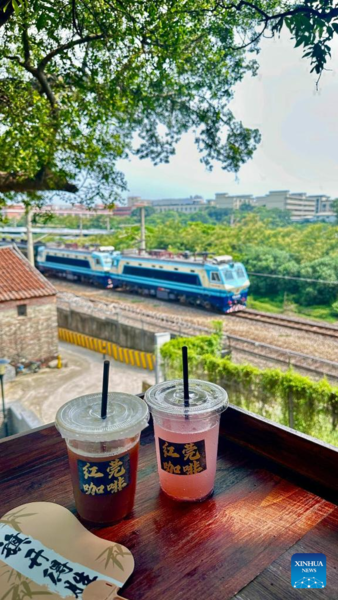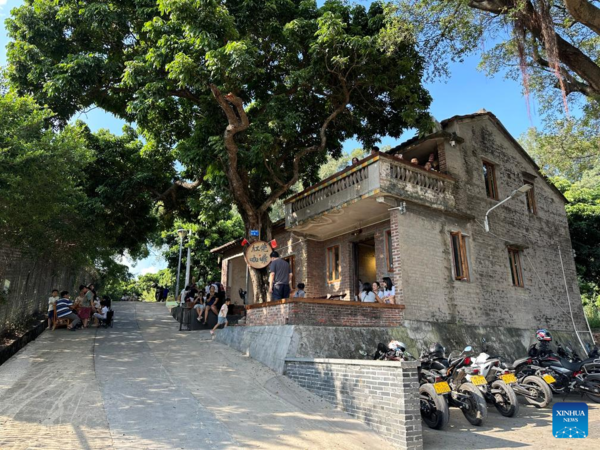Village Cafés Brewing New Getaways in Rural China
 |
| This undated file photo shows two drinks on a table at the Red Guan Coffee in Dongguan, south China's Guangdong Province. [Photo by Ye Zhongwen/Xinhua] |
BEIJING, May 19 (Xinhua) — On a crisp Sunday morning, Zheng Shiying drove 130 kilometers to a village on the outskirts of Beijing, not for a hike or a hot spring, but for a cup of coffee.
It took Zheng over three hours to reach the café. Housed in a crumbling stone building that looks untouched by time, by the time Zheng arrived it was already packed with weekend visitors, and finding a seat was a bit of a challenge.
"I've never woken up this early for work," she joked.
A city café keeps you awake, while a village café helps you unwind. Zheng is one of many urban Chinese heading deep into the countryside in search of rural calm. Far from the city's polished espresso bars, village cafés offer customers a refreshing change of pace.
In a village in Dongguan, for example, a café by a railway has become an urban-escape hotspot. Facing the tracks and shaded by ancient trees, it offers front-row seats to thundering trains.
Owner Ye Zhongwen, who loved chasing trains as a kid, opened the Red Guan Coffee in 2024 in a two-story house that had sat vacant for years.
For Ye, the remote location wasn't a flaw but a feature. And Ye is not alone, some of the café's customers drive 40 minutes from Dongguan, others travel over two hours from Shenzhen, and even visitors from Hong Kong have made the trip.
"At first, villagers were curious and skeptical," Ye said. "Now many are regulars, and they're glad the café is drawing more people who also buy their farm produce and other goods."
China's rural café boom has been fueled by the rise of rural tourism. According to estimates from the Ministry of Culture and Tourism, rural tourism across the country welcomed 707 million visits in the first quarter of this year, up 8.9 percent year on year.
Over 40,000 cafés have sprung up in China's countryside. Increasingly, these village cafés are more than just coffee stops but creative hubs revitalizing rural spaces.
In a village in Quzhou City, Zhejiang Province, one such café sprang to life from a dilapidated sheep shed halfway up an abandoned mining hill.
"It was the only usable structure around back in 2023," said Yu Jiafu, founder of the Sheep Shed Café. "No roof, just broken walls and waist-high weeds. We gave it the English name 'Young People Coffee', a playful pun on 'Yang Peng' or sheep shed in Chinese, hoping to draw more young people to the countryside."
Yu, a graduate of the China Academy of Art, saw beauty and potential in the wild setting. He and his team rebuilt the roof with thatch, kept the original stone structure, and used nearby mountain rocks to build the bar.
"Our guests now range from city dwellers on weekend road trips to local youths who treat this place like their living room," Yu said.
At its busiest, the café welcomed more than 5,000 visitors in a single day. On regular weekends, guests come from nearby cities like Hangzhou and Shanghai. Even foreign travelers and internet influencers with millions of followers have stopped by.
Since its opening, the café's grounds have evolved to suit the clientele, now boasting a swimming pool, an open-air performance stage, a camping area, and a wood-fired bread oven.
In April, Zhejiang hosted its first "Village Café Masters" event, where 33 coffee entrepreneurs showcased their brands and products. A rural coffee base was also unveiled that links academia, industry, and local communities in support of countryside coffee development.
Alongside the event, local authorities introduced support programs including digital training, resource matchmaking, and e-commerce tools to help young entrepreneurs thrive in rural areas.
These efforts are part of Zhejiang's broader initiative to encourage youth-led development in rural areas. By 2025, Zhejiang plans to establish 1,000 rural practice hubs to offer young people more room to explore, innovate, and stay rooted in the countryside.
For Yu, that mission is already personal. "I'm not here just to run a café," he said. "I want to help the village grow, one cup at a time."
 |
| This photo taken in 2025 shows the Red Guan Coffee in Dongguan, south China's Guangdong Province. [Photo by Ye Zhongwen/Xinhua] |
(Source: Xinhua)
Editor: Wang Shasha
Please understand that womenofchina.cn,a non-profit, information-communication website, cannot reach every writer before using articles and images. For copyright issues, please contact us by emailing: website@womenofchina.cn. The articles published and opinions expressed on this website represent the opinions of writers and are not necessarily shared by womenofchina.cn.








.jpg)

 WeChat
WeChat Weibo
Weibo 京公网安备 11010102004314号
京公网安备 11010102004314号